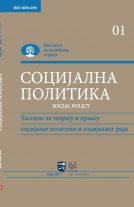- Home page
- Researchers
- Jelena Tanasijević
Jelena Tanasijević
University of Belgrade, Faculty of Political Sciences

SUPPORTING DEVELOPMENT OF RESILIENCE AMONG CHILDREN IN FOSTER CARE
The modern concept of social protection is directed towards empowerment of children and youth in foster care. As developmental trajectories of these children and young people are frequently marked with experiences of change, loss and trauma, it is of utmost importance to foster their capacity to cope with and overcome life's difficulties. The development of resilience in this vulnerable group can be supported by providing suitable conditions in different aspects of their foster care functioning. The aim of this study was to examine which domains of foster family life are sources of strength and support for children and young people in foster care. Foster carers' reports on 53 children and young people they care for wereanalysed. The sample consisted of 42 foster parents (33 women and 11 foster relatives) from Belgrade and Valjevo. Finding show that children and young people in our study drew the most strength and support from strong family relationships filled with warmth, love and concrete forms of support, as well as education that iscontinues, designed to meet the needs of the student and carried out through cooperation of the school and the foster parents. No differences were found between reports of foster parents from different cities, whilefoster care families based on the kinship relations were better suited to support resilience in children and young people. The implications of these findings are further discussed in the paper.

Challenges of Modern Age in the Field of Work-family Reconciliation Policies in Serbia
The challenges faced by modern countries have influenced the change of priorities in social policies and, in this context, also in family-related policies. As we know, labor market opportunities and possibilities for working parents are not solely the reflection of a country’s economic situation. Cultural aspects of a country and working parents’ individual characteristics also have an impact on their position in the labor market. Support provided by the state to working parents is another determining factor in their position and viability on the labor market. Because of that, institutional arrangements in this area are very important and they present an intervention field in most European countries, including Serbia. Taking that into account, a frequent topic of public debate is the question what models should be put in place in order to assist parents to enter and remain in the labor market there continuing to fulfil their family responsibilities. The key question of this assignment is to analyze the status of working parents and challenges they face in their efforts to strike a balance between family commitments and work obligations.
